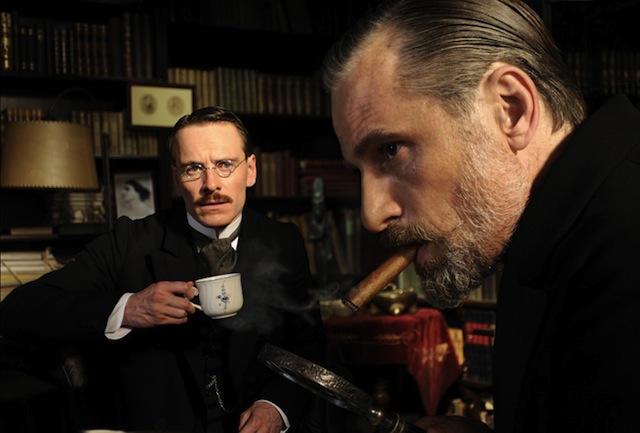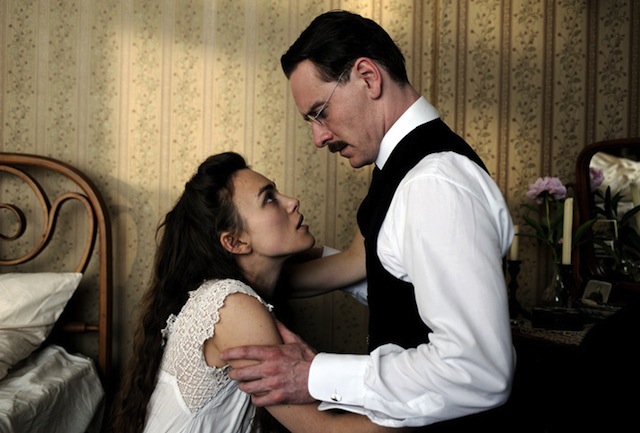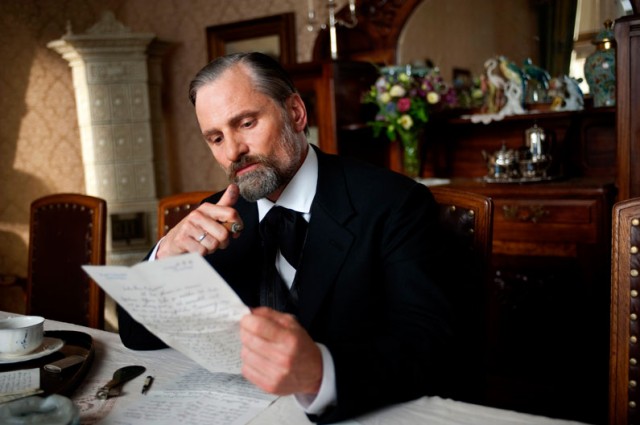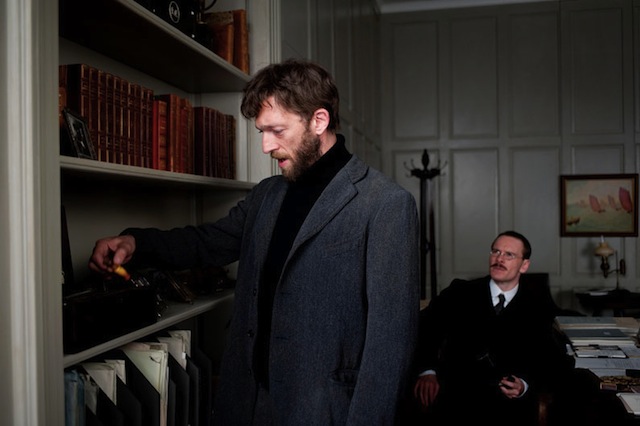
A Dangerous Method is a historical drama based on the stage play The Talking Cure by playwright Christopher Hampton * (Dangerous Liaisons -play and screenplay, Atonement – screenplay). David Cronenberg, director of sci-fi thrillers Videodrome and The Fly (1986), and most recently of A History of Violence and Eastern Promises fame, directs the cast which includes Keira Knightley, Viggo Mortensen as Sigmund Freud, Michael Fassbender as Carl Jung and Vincent Cassel as Otto Gross.
A Dangerous Method tells the story of the relationship between Jung and Sabina Spielrein (Knightley), a patient he is treating for a psychosexual dysfunction. His fascination with the nature of her condition leads him to employ the analytical method of Freud (“the talking cure”). He goes to Vienna where he finally gets a chance to meet his idol and ‘father figure.’ Although the two gentlemen get along, there is an air of tension about; the film portrays this as being partly down to Freud’ possible resentment of the comfort in which Jung lives, courtesy of his wife’s wealth.
Back home in Switzerland Jung and Spielrein’s doctor-patient relationship develops into a friendship and eventually leads to a sexual relationship. The consummation of this relationship, one could imply, is as a result of Jung’s conversation about human nature and desire with Otto Gross, who himself is referred to Jung by Freud.
It is at this point that Jung’s relationship with Spielrein takes center stage and its implications become one of the primary drivers that place a wedge between Freud and Jung.
Not necessarily know for fully straight-on dramatic pieces, much less one based on historical events, this is a change of pace for David Cronenberg. I like to think of this as a kindler, gentler Cronenberg, even if the subject matter, which deals with psychoanalysis and sexual repression/expression, is quite layered and complex.
Christopher Hampton’s intimate knowledge of the source material shines through and allows the film to be adapted and expanded cinematically. Too often when a story is translated from stage to screen, it presents a great challenge for the screenwriter – how to make the environs, which are initially dramatized for the restrictive space of a theater’s stage, breathe.
Viggo Mortensen transforms himself (yet again), this time as the father of psychoanalysis. So much of his portrayal of Freud is in the nuanced looks, glances and expressions. These nuances told me more than any speech or soliloquy could possibly have. I am not sure another actor would be able to pull it off. It has been often stated that some director-actor pairs create something special on screen. In my opinion, this film confirms what I already know about the pairing of Cronenberg and Mortensen – they are such a pair.
Fassbender’s Carl Jung is a man who despite all efforts to repress his desire, finally surrenders. Similarly, you can see the tension and anguish on his face and in his body. This is yet another in a string of performances where Mr. Fassbender takes full possession of his character.
Rounding out the ‘big three,’ Keira Knightley turns in a solid performance as Sabina, a woman who starts off as a ‘mad woman’ to a refined but still passionate doctor who affects Jung and Freud in ways they could not imagine. I have always been a fan of Ms. Knightley and she seems to be coming into her own as a thespian who is constantly seeking to challenge herself with complex and demanding roles.
In an all too brief appearance as Otto Gross, Vincent Cassel’s “and” credit is more than deserved. In his brief time on screen, he accomplished what was asked of him – he turns the tables on the doctor-patient interaction and in his talks with Jung creates a point of crises in Jung from which there was no turning back.
Last, but certainly not least, lying in the background of the film but ever present is the lovely musical score by Howard Shore, frequent Cronenberg collaborator who is a three-time Academy Award and two-time Golden Globe winner for his work on Peter Jackson’s The Lord of the Rings trilogy; he was also nominated for a Golden Globe Award for his score for The Aviator, directed by Martin Scorcese.
Solid direction, fantastic writing and very fine performances, courtesy of an outstanding cast, make this film a must see.
* The play itself is based on the book, A Very Dangerous Method, written by John Kerr.




